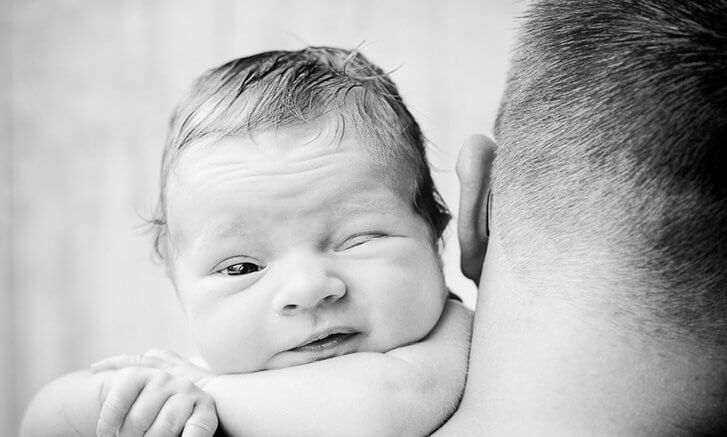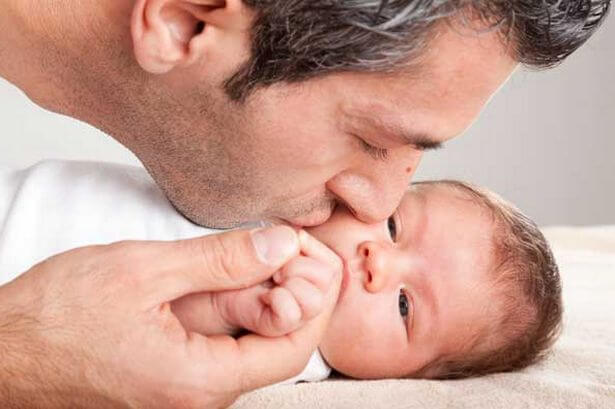A Father Who Cares For His Baby Is Not Just "Helping"

A father who attends to the cries of his baby, rocks him, changes his diapers and teaches him his first words — he isn’t “helping” the mother. He is performing the most wonderful and responsible role of his life: fatherhood. These are undoubtedly the nuances of a language that we often fall into, and which we need to change.
Nowadays, and to our surprise, we still hear many people say classic phrases. “My spouse helps me around the house” or “I help my wife take care of the kids”. It’s as if the tasks and responsibilities of a household and a family were inherited. As if they had a distinctive seal associated to gender, which we haven’t quite shaken from our thought patterns.
“A father is not he who gives his life, a father is he who educates us with love.”
A father figure is just as relevant as a mother. Nonetheless, it’s obvious that the first bond of attachment the newborn makes during its first few months is focused on the maternal figure. However, nowadays, the classic image of the progenitor that was focused on iron authority and the basic sustenance of the home must be invalidated.
Because a father “doesn’t help“. He isn’t someone that goes around the home and alleviates his spouse’s workload from time to time. A father is someone who knows how to be present, who loves, who cares for and accepts the responsibility of that which gives his life meaning: his family.

The brain of men during child-raising
Something we all know is that mothers’ brains experiment amazing changes during the raising of their baby. Pregnancy, breast feeding, as well as the everyday care of their children promote a cerebral restructuring with adaptive objectives. This is simply amazing. Not only do levels of Oxytocin increase, but their neuronal synapses also change. This increases the sensibility and perception of the woman in order to let her recognize the emotional state of her baby.
Now… what happens to the father? Is he maybe a mere spectator that is biologically immune to this event? Not at all. In fact, men’s brains also change, and they do so in a spectacular way. According to a study conducted by the Gonda Center of Brain Sciences of the University of Bar-Ilan, if a man plays the main role in the caring of his child, he will undergo the same neuronal change as a woman would.
Through various cerebral scanners, carried out in both heterosexual as well as homosexual fathers, it was proven that the amygdala’s activity was 5 times more intense than normal. This structure is linked to danger warnings and a greater sensibility of the emotional world of babies.

Likewise, and this fact will surprise more than one of you, the levels of oxytocin secreted by a father that plays the role of the primary caretaker is the same as that of a woman that also plays her role as a mother. All of this reveals something we already knew: a father can relate to his children to the same emotional degree that a mother can.
Responsible parenthood
Some fathers simply don’t know how to be present. There are toxic mothers and wonderful fathers that raise their children by themselves. There are also extraordinary mothers that leave a mark within their babies hearts that’s simply impossible to erase. Raising a child is a great challenge that some of us are simply not prepared for, and that many others face as the most enriching challenge of their lives.
“Men and women should feel free to be strong. It’s time that we see genders as a unit, not as a game with opposite poles. We should stop challenging each other.”
Emma Watson’s speech at the UN

Helping each other and sharing the responsibility
Reaching agreements, being allies to each other and being clear on the fact that the care of the kids is a mutual responsibility and not one exclusive to one parent will only create an enriching harmony within the home. The child will grow up in this environment happily, having a clear example to follow.
Likewise, and beyond the great efforts that each family carries out within their own home, it’s necessary that society also be sensitive to this type of language that feeds sexist labels and stereotypes.
Mothers that continue their professional careers and fight to have a place in society aren’t “bad mothers”. They aren’t neglecting their children. On the other hand, fathers who give their babies their bottles and look up home remedies for babies cramps, who go out to buy diapers and bathe their babies every night, they are not helping. They are exerting their role as a father.
A father who attends to the cries of his baby, rocks him, changes his diapers and teaches him his first words — he isn’t “helping” the mother. He is performing the most wonderful and responsible role of his life: fatherhood. These are undoubtedly the nuances of a language that we often fall into, and which we need to change.
Nowadays, and to our surprise, we still hear many people say classic phrases. “My spouse helps me around the house” or “I help my wife take care of the kids”. It’s as if the tasks and responsibilities of a household and a family were inherited. As if they had a distinctive seal associated to gender, which we haven’t quite shaken from our thought patterns.
“A father is not he who gives his life, a father is he who educates us with love.”
A father figure is just as relevant as a mother. Nonetheless, it’s obvious that the first bond of attachment the newborn makes during its first few months is focused on the maternal figure. However, nowadays, the classic image of the progenitor that was focused on iron authority and the basic sustenance of the home must be invalidated.
Because a father “doesn’t help“. He isn’t someone that goes around the home and alleviates his spouse’s workload from time to time. A father is someone who knows how to be present, who loves, who cares for and accepts the responsibility of that which gives his life meaning: his family.

The brain of men during child-raising
Something we all know is that mothers’ brains experiment amazing changes during the raising of their baby. Pregnancy, breast feeding, as well as the everyday care of their children promote a cerebral restructuring with adaptive objectives. This is simply amazing. Not only do levels of Oxytocin increase, but their neuronal synapses also change. This increases the sensibility and perception of the woman in order to let her recognize the emotional state of her baby.
Now… what happens to the father? Is he maybe a mere spectator that is biologically immune to this event? Not at all. In fact, men’s brains also change, and they do so in a spectacular way. According to a study conducted by the Gonda Center of Brain Sciences of the University of Bar-Ilan, if a man plays the main role in the caring of his child, he will undergo the same neuronal change as a woman would.
Through various cerebral scanners, carried out in both heterosexual as well as homosexual fathers, it was proven that the amygdala’s activity was 5 times more intense than normal. This structure is linked to danger warnings and a greater sensibility of the emotional world of babies.

Likewise, and this fact will surprise more than one of you, the levels of oxytocin secreted by a father that plays the role of the primary caretaker is the same as that of a woman that also plays her role as a mother. All of this reveals something we already knew: a father can relate to his children to the same emotional degree that a mother can.
Responsible parenthood
Some fathers simply don’t know how to be present. There are toxic mothers and wonderful fathers that raise their children by themselves. There are also extraordinary mothers that leave a mark within their babies hearts that’s simply impossible to erase. Raising a child is a great challenge that some of us are simply not prepared for, and that many others face as the most enriching challenge of their lives.
“Men and women should feel free to be strong. It’s time that we see genders as a unit, not as a game with opposite poles. We should stop challenging each other.”
Emma Watson’s speech at the UN

Helping each other and sharing the responsibility
Reaching agreements, being allies to each other and being clear on the fact that the care of the kids is a mutual responsibility and not one exclusive to one parent will only create an enriching harmony within the home. The child will grow up in this environment happily, having a clear example to follow.
Likewise, and beyond the great efforts that each family carries out within their own home, it’s necessary that society also be sensitive to this type of language that feeds sexist labels and stereotypes.
Mothers that continue their professional careers and fight to have a place in society aren’t “bad mothers”. They aren’t neglecting their children. On the other hand, fathers who give their babies their bottles and look up home remedies for babies cramps, who go out to buy diapers and bathe their babies every night, they are not helping. They are exerting their role as a father.
This text is provided for informational purposes only and does not replace consultation with a professional. If in doubt, consult your specialist.







